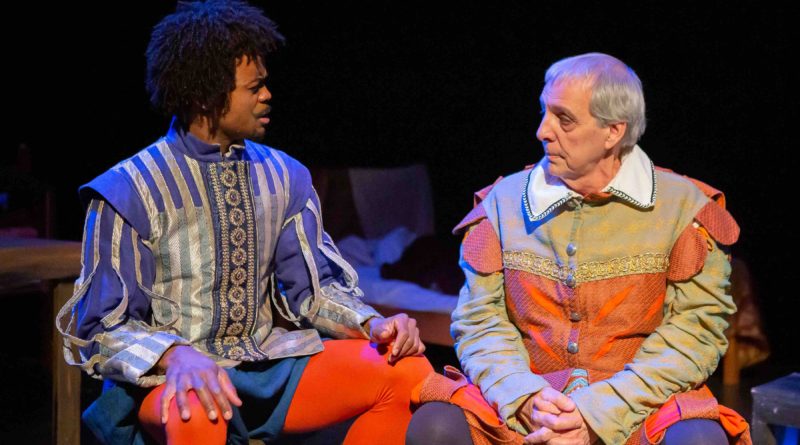INTERVIEW: For ‘Brocade,’ audiences travel to 17th-century Venice
Photo: Brocade stars, from left, Jacob Silburn and Gene Santarelli. Photo courtesy of Hunter Canning Photography / Provided by Off Off PR with permission.
It’s time to step back in time and travel to 17th-century Venice, Italy. That’s the time and place for a new show by Robert E. DiNardo. Brocade, directed by Shela Xoregos, plays through Feb. 16 at Theater for the New City in New York City.
In the two-hour show, there’s a motley variety of characters around this city of canals. For starters, there’s a woman who once lived a notorious life and is now trying to pass off as a nun, according to press notes. There’s a courtier who wears his own gowns and a 60-year-old virgin dressmaker, among many others. They are all entangled in multiple narratives of love and laughs.
Xoregos is a longtime director of New York theatrical productions. According to her biography, some of her favorite shows have been Hamlet, The Importance of Being Earnest and Much Ado About Nothing. Her choreographic work has been featured by Oakland Ballet, San Francisco Dance Spectrum and Seattle Chamber Dance.
Recently Hollywood Soapbox exchanged emails with Xoregos about her work on Brocade. Questions and answers have been slightly edited for style.
What did you appreciate about this play when you first read it?
The unusual characters and setting, the literate writing and excellent research done by playwright Robert E. DiNardo. Many contemporary plays are poorly written with stock characters, but Brocade immediately sparked my desire to bring it to life on stage. Brocade is theatrically inspiring — a combination of a largely unknown time and place and different characters which would be challenging to cast and period fashion design. It depicts elements of gay life in 17th-century Venice — rampant — and the sophisticated mix of inhabitants from many countries — much like the New York of today!
What can audience members expect from the comedic trip to 1615 Venice?
To be plunged into a different world, with a cast who has explored each role he/she is playing. The comedy comes from the various characters’ differences and the surprises which come in the playwright’s plotting; 17th-century fashion is also discussed and shown in the costumes by Sara Decker. We have tried to be as authentic as possible.
How will original music be interwoven into the play?
There is only one original piece of music: a song by Barbara Rottman, with lyrics by the playwright and Ms. Rottman. All other music is for the violin and comes from composers of the period, such as Monteverdi, chosen and played by our music director, Laura Zawarski. The violin, at that time, was not deemed an important or solo instrument. Composers such as Paganini, who used the violin as a virtuoso instrument, came later.
What’s it like working with this ensemble of actors?
They take my breath away! We are having intense but happy rehearsals. Everyone loves the play, which has consumed us all. The actors take every suggestion and add wonderful inventions of their own. They are developing beautiful, rounded portrayals.
When did you transition from the dance world into the theater world?
I always felt that all the performing arts were important. Before I came to New York (in the ’80s), I was in San Francisco and had changed the name of my company from Xoregos Dance to the Xoregos Performing Company, as we often used texts of plays and poetry — certainly music — to the choreography, and I auditioned for dancers who could act as well as dance. I choreographed (among many others) to E. E. Cummings poems, an original monologue with dance by Rick Foster, commissioned new music from several composers, and when we had a live pianist, always programmed a solo contemporary work as part of the concert. I thought, if people came to see a dance concert and saw a hybrid program, it was misleading, which is why I changed our name. But dance remains, for me, the most important ethereal, magnificent of all art forms — performed by the human body.
What do you hope audience members have in their mind when they walk away from a performance of Brocade?
That they have had an enchanting, imaginative time in the theater and will, upon thinking on it later, appreciate the writing, acting, design and musical elements of Brocade.
By John Soltes / Publisher / John@HollywoodSoapbox.com
Brocade, directed by Shela Xoregos, will play through Feb. 16 at the Theater for the New City in New York City. Click here for more information and tickets.

